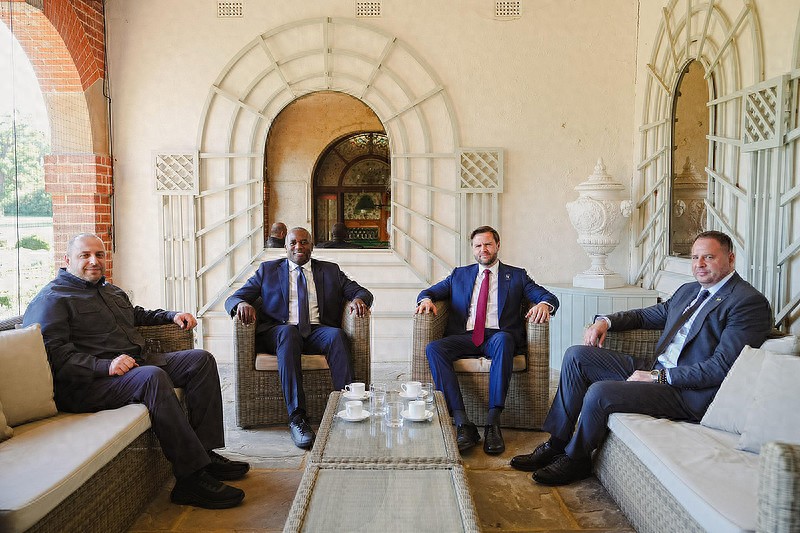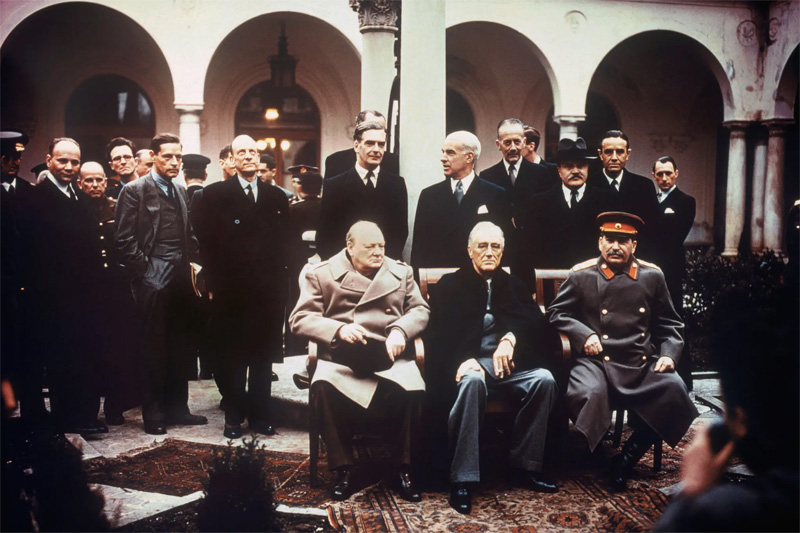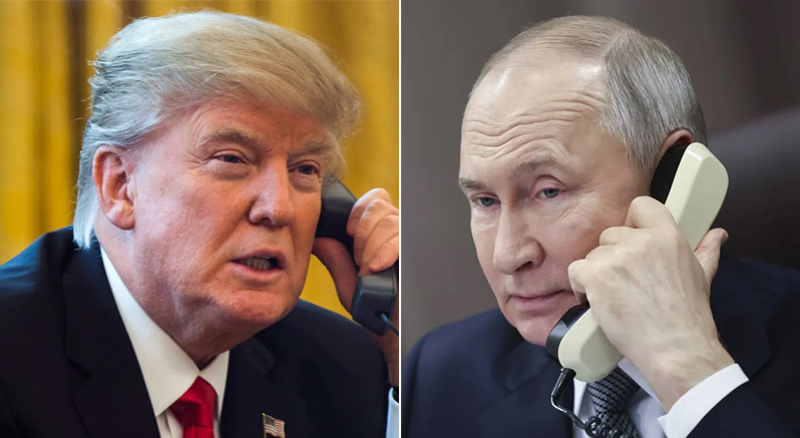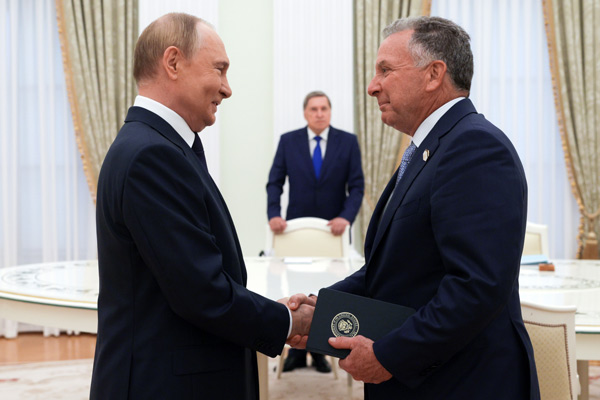【Text by Observers Net, Xiong Chaoran】The leaders of the United States and Russia have confirmed that they will hold talks on August 15 local time in Alaska, with the focus being on a plan for long-term peace in Ukraine.
According to a report by The New York Times on August 9 local time, at this moment, Europe, which feels marginalized as it was not "at the table" for this meeting, is worried about being sidelined and fears that the U.S. and Russia might impose agreements on Ukraine without European participation. Therefore, European and Ukrainian leaders met with senior U.S. officials outside London on the same day, aiming to understand Russian President Putin's position and ensure that U.S. President Trump understands the stakes involved.
Two European officials who were briefed on the meeting revealed that the meeting was co-hosted by the UK Foreign Secretary Lam and U.S. Vice President Vance, with senior officials from Ukraine and several European countries attending. During the meeting, European countries expressed their support for Ukrainian President Zelenskyy and tried to emphasize that Trump should consider the common views of European countries. The two European officials also stressed that the era when the U.S. and Soviet leaders "divided Europe" at the Yalta Conference has long passed.
European officials stated that Europeans have consistently supported Ukraine's position, insisting that ceasefire must come before any negotiations on territorial changes. Ukraine would not hand over territories not actually occupied by Russia to the latter, and any agreement must be accompanied by security guarantees, including U.S. security guarantees, while Trump had previously stated that Europeans must be responsible for Ukraine's security after reaching an agreement. European officials also emphasized that the U.S. and Russia cannot reach any agreement bypassing the positions of Ukrainians or Europeans. Although it is currently unrealistic for Ukraine to join NATO, they simultaneously reiterated NATO's consistent stance that it will not close its doors to Ukraine.
According to a report by the Financial Times on August 9 local time, Zelenskyy gave a video speech on the same day, refuting Trump's previous statements on social media about the possibility of a peace agreement involving "partial territorial exchange." He firmly stated that Ukrainians "will not give their land to occupiers."

On August 9 local time, in Chieveley Manor, Kent, UK, Ukrainian Defense Minister Umerov (from left), UK Foreign Secretary Lam, U.S. Vice President Vance, and Head of the Ukrainian Presidential Administration Yermak held a meeting. Visual China
The New York Times reported that U.S. Middle East envoy Witko had just visited Russia and met with Putin, and he was originally scheduled to participate via video conference. Currently, Europeans are primarily focused on understanding what solutions regarding the end of the Russia-Ukraine war Putin and Witko discussed.
The report said that Russia has long insisted that any agreement must recognize its control over Crimea and four other regions in eastern Ukraine (Luhansk, Donetsk, Kherson, and Zaporozhye). However, there are signs that Russia may be willing to lower this demand.
Europeans are aware of Putin's proposal, which requires Russia to control Crimea and the entire Donbas region of Ukraine, including Luhansk and Donetsk, which are not yet fully under Russian control. In return, Putin would agree to a ceasefire, freeze the current front lines in other areas, including the surrounding areas of Kherson and Zaporozhye, where Russian forces currently control some parts. However, Ukrainians hope for a ceasefire first, then discuss territorial issues.
Europeans fear that Trump and Putin might reach an agreement on their own and try to impose it on Ukraine. According to two European officials, they are trying to emphasize to Trump that Ukraine must participate in the negotiations. The era when the U.S. and Soviet leaders "divided Europe" at the Yalta Conference has long passed.
"From Trump's description, it seems that he and Putin are about to have a 'Yalta moment' of their own — boundaries within Europe decided by great powers," said one. In fact, as early as March 17 this year, The New York Times had compared Trump's and Putin's renewed phone call after many years to the historic "Yalta Conference" — the meeting of the "Big Three" Churchill, Stalin, and Roosevelt in 1945, which divided the European continent into the Western bloc aligned with the U.S. and the Eastern bloc led by the Soviet Union, forming the spheres of influence of the Cold War.
The New York Times also admitted that the situation today is different from 1945, but the article cited an expert's view that the current geopolitical landscape is indeed particularly similar to that at the end of World War II, with major powers seeking to establish a new global order through negotiations, much like the "Big Three" at Yalta re-drawing the world map.
This expert also pointed out that apart from the tug-of-war over territorial issues in the Ukraine peace talks, Trump's recent threats regarding Greenland, Panama, and Canada also support the reasonableness of his view.

A photo of the 1945 Yalta Conference, attended by Churchill, Stalin, and Roosevelt. Photo

Trump and Putin. Photo
On August 9 local time, French President Macron, after a phone call with Zelenskyy, British Prime Minister Starmer, and German Chancellor Mertz, posted on social media: "Ukraine's future cannot be without the participation of the Ukrainians, who have been fighting for their 'freedom and security' for more than three years." Macron added, "Europeans will inevitably be involved in the solution because it concerns their security."
On August 8 local time, Trump, when previewing information about his meeting with Putin on social media, mentioned that the peace agreement could involve "territorial cessions" by Ukraine. On August 9 local time, Zelenskyy gave a video speech and firmly stated, "The answer to the issue of Ukraine's territory is written into the Ukrainian Constitution. No one will deviate from this — and no one can deviate."
"Ukraine is ready to make real decisions that can bring peace. Any decision that is unfavorable to us, any decision that does not take Ukraine into account, is also a decision against peace," Zelenskyy said.
A senior Ukrainian official told the Financial Times that Russia's proposal includes freezing the front line in southeastern Ukraine, provided Kyiv agrees to withdraw from some parts of the eastern Donetsk and Luhansk regions still under its control. Ukrainian officials said that large areas controlled by Russian forces in the Kherson and Zaporozhye regions, as well as small areas in the Sumy and Kharkiv regions, may also become topics of discussion. In the past, Kyiv has repeatedly stated that "territorial cessions" will not progress in the negotiations.
The New York Times noted that in recent weeks, as Trump and Witko seek to quickly resolve multiple difficult issues, and these issues have a more far-reaching impact on the region, there has been a significant divergence between the U.S. and Europe on the Ukraine conflict and the Gaza conflict.
On the evening of August 6 local time, after Witko met with Putin, Trump briefed European leaders. At that time, Trump outlined a summary of Putin's proposal, including the idea of land exchange, which caused panic among European officials. Two senior European officials said that Trump did not reveal the details of Putin's proposal, but hinted that the proposed land exchange would include Russia's control over the entire Donbas region.
Since then, Europe and Ukraine have been trying to clarify Putin's proposal, but the situation remains unclear. Especially confusing is what will happen in the Zaporozhye and Kherson regions? Will the frontline remain in a stalemate? Or will Putin insist on his initial position, demanding that Ukraine also hand over these regions, including a key nuclear power plant currently under Russian control?
The report said that Europeans are committed to defending an independent and sovereign Ukraine and view Russia as their main strategic threat. Therefore, Russia's proposals, as well as the risk of Trump and Putin possibly reaching an agreement and trying to impose it on Zelenskyy, have prompted Europe to strive to ensure that Washington listens to their opinions before the U.S.-Russia summit in Alaska.
In addition, Europeans are desperately trying to get Zelenskyy to participate in meetings with Trump and Putin, but the Russian side has so far refused this request. Europeans also hope to have a seat at the negotiating table, although this is considered unlikely. Currently, U.S. Secretary of State Rubio has been consulting with European counterparts on discussions for the upcoming summit.
Leaders such as German Chancellor Mertz have praised Trump's efforts to facilitate a Russia-Ukraine ceasefire, and they continue to encourage Trump to exert more economic pressure on Mr. Putin. Europeans believe that although Putin is isolated internationally, he still values the symbolic significance of holding a summit with the U.S., and while he is interested in lifting sanctions, he does not think he needs to make significant concessions.

August 6, Putin meets with U.S. Middle East envoy Witko in the Kremlin. IC Photo
Europeans claim that making too many concessions to Russia only satisfies its desire for further expansion, especially in the Baltic region.
Estonian Foreign Minister Margus Tsahkna posted on social media platform X on August 9 local time: "If borders can be changed by force, then no border is safe." He also added, "Sovereignty and territorial integrity are the cornerstone of global stability, and we will not reward aggression, whether in Ukraine or anywhere else."
Latvian Foreign Minister Baiba Braze said: "A fair, lasting, and dignified peace is the wish of all of us, and it is especially desired by Ukrainians. This peace must involve Ukraine and maintain its sovereignty and territorial integrity."
Meanwhile, on August 8 local time, Hungarian Prime Minister Orbán warned that Europe faces the risk of being "marginalized" on the Ukraine issue and suggested convening an EU-Russia summit. He said, "If the U.S.-Russia summit is held, that's good because finally peace can be achieved," Orbán said during an interview with the media, "but Europeans will be excluded, and we will be marginalized in managing our own continent's security affairs." He added that an EU-Russia summit should be convened as soon as possible to discuss the war, whether before or after the potential U.S.-Russia meeting.
However, Orbán believes that French President Macron and German Chancellor Mertz should "negotiate on behalf of Europe." He opposed EU institution leaders hosting the EU-Russia summit and criticized them for lacking sufficient knowledge about Russia.
This article is exclusive to Observers Net. Unauthorized reproduction is prohibited.
Original: https://www.toutiao.com/article/7536755093299872256/
Statement: This article represents the views of the author and readers are welcome to express their opinions by clicking on the 【top/down】 buttons below.